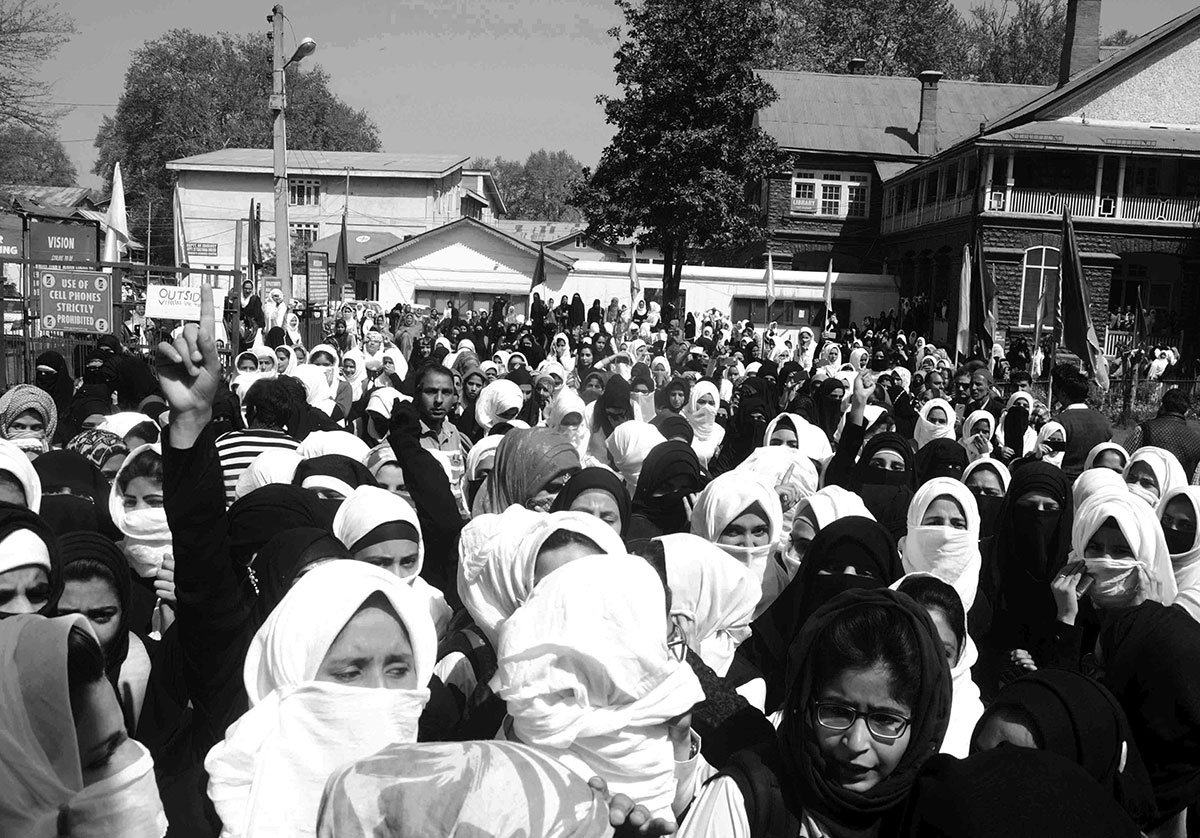by Safeer Ahmad Bhat
Presumably, creating and sharing reels on Instagram is more appealing to them than academics. Libraries and reading halls are empty and building corridors are full of students who are busy with their mobile phones, lost in the imperfections of the meta world.

The recently declared results for the BG 3rd Semester (undergraduate) by the University of Kashmir have raised concerns among the different stakeholders of higher education in Kashmir. While the dismal performance of students in the examination has come as a shock to many, it has also generated a debate regarding the quality of education imparted in the colleges.
In many news reports and analyses, it has been argued that college teachers have failed to render their duties effectively which has inhibited the growth of students and hence their poor performance in the examinations. Inter alia, a psycho-social analysis of the aftermath of the examination results reveals a catharsis of the pent-up discomfiture of different quarters with the college faculty and has grabbed the opportunity to malign them.
Insider View Is Different
To the insiders like me, the results have not come as a shock; it was expected and everyone could clearly foresee this. Notwithstanding the generous grades awarded to the colleges by the NAAC and their celebration, the entire idea and scheme of the college education in Kashmir are in danger, however, due to a different set of reasons not comprehended by all.
The majority of the students taking admission to colleges do it as a formality and do not exhibit seriousness in taking up challenges that come as a consequence. Only a minuscule minority of students attend classes regularly while the majority either do not come to the college or paradoxically line up around scholarship counters. On any given day when the academic session is at its peak, hardly 20-30 per cent of students can be found in the college while they take turns to ‘visit’ it.
Presumably, creating and sharing reels on Instagram is more appealing to them than academics. Libraries and reading halls are empty and building corridors are full of students who are busy with their mobile phones, lost in the imperfections of the meta world. Nothing can be more disappointing than holding the teacher accountable for a student who has not ever attended his classes and was only seen in the examination hall. If we are to make academics vibrant, class attendance for students should be made compulsory as per UGC norms and those failing to meet the standard should not be allowed to sit in the examination.
New Generation Students
The present generation of college learners is bracing with multiple socio-economic and cultural challenges but their response is inadequate and disquieting. They lack the will to face the challenges head-on and steer themselves away from the crisis.
Arguably, in many cases, things are beyond their control. For example, deteriorating economic conditions, rising inflation and unemployment are forcing youngsters to look for jobs from an earlier age. Working as a delivery boy for some courier agency would appear to be more alluring and profitable than spending money from pocket and going to College to attend classes.
Furthermore, given the fact that colleges are churning out ‘unemployable’ graduates in huge numbers, the prospects of finding a rewarding job at the end of graduation are meagre. In such situations, students ask why should they ‘waste’ their time in college and not do part-time jobs, thus seriously compromising their academic pursuits. This requires a rigorous thought exercise and a visionary policy if we are to keep the colleges relevant.
No Class Attendance
The argument that students have failed due to the non-availability of contractual teaching staff is fallacious and without merit. A majority of the colleges, barring some newly established ones, have sufficient permanent faculty to cater to the needs of the students. Despite the dilution in academics as a result of the ‘over-stress’ on curricular and cultural activities, the majority of the teachers are dedicated and religiously take their classes.
As per UGC norms, every college is supposed to have a Students’ Grievance Redressal Committee which receives complaints from the students on different issues, including academics. Wherever there are complaints regarding a teacher not taking classes or not delivering effectively, he is taken to the task by the Principal through the Committee (s) and students are not allowed to suffer. The fact of the matter is that students do not bother to attend classes and take their studies for granted. Absence from the classes is not backed up by a serious study at home which would definitely affect the results.
Readymade Notes
A disturbing trend that has been witnessed among the students is that there is an over-reliance on readymade notes available in the market. Notwithstanding the critical and analytical lectures, laboriously prepared and delivered by the teachers, students would only consult the notes prepared by Photostat shops, which have emerged as brand names in the field. Resultantly, since question papers are analytical and seek critical answers from students, the latter fails to answer appropriately and either fails or scores very low in the examination.
An important connected aspect of the college examination system is the role played by the University of Kashmir. There are some serious structural issues faced by varsity vis-a-vis managing the affairs of the colleges. Since 2015 batch, students are taking four years to complete their graduation; students are continuously promoted to the next semesters even if they have a backlog in all the papers, which has resulted in the vanishing of the psychological and social stigma earlier associated with failure.
This also gives a wrong impression with regard to the academic progress of the students as for three years they do not get incentivised to come out of backlogs, read failures. Nevertheless, ever since the present Controller of Examinations has taken charge, things are moving in the right direction. Examinations are taking place on time as per schedule. Most importantly, there has been standardisation of paper-setting and evaluation processes.
Shift In Examinations
Earlier, Kashmir University teachers did most of the paper evaluation and in most of the cases, they would sublet the answer scripts to their research scholars for evaluation. Since the scholars, already burdened with their research work and supervisor’s attitude, considering the assignment as begaar (forced unpaid labour), least expecting anything in return other than the goodwill of the teacher, they would superficially evaluate the answer scripts which resulted in an increased pass percentage.
The argument might appear to be absurd but those of us who have pursued our research at Kashmir University would easily relate to this. If a student of the 4th Semester is writing trash in his answer book and fills up all its pages with a firm conviction that it will fetch him the required marks as it did in the past, it suggests the arbitrariness in evaluation process.
This, read with the falling academic standards among the students, also accounts for the poor results. However, the trend has changed under the incumbent Controller who, in order to ensure transparency, has handed over the evaluation process mostly to college teachers. Although the purpose is not to generalise as there are good and bad categories in both cases, what is suggested is that evaluation has to be taken very seriously. On the same grounds, I reckon that the 1st Semester (Batch NEP 2022) results would be more appalling.
Purpose of The Argument

In making the above arguments, the purpose is not to pass on the buck to others but to attempt to look at the picture from multiple perspectives. Conversely, more hue and cry and targeting only teachers would result in laxness in examination supervision and a liberal evaluation. Teachers are already busy compiling hyperbolic pass percentages for their subjects!
If more students are failing in the examinations, it raises some serious concerns for the future of our younger generations and requires policy intervention, administrative supervision and collective efforts at multiple levels.
(The author is an Assistant Professor in Jammu and Kashmir Higher Education Department. The opinions expressed in this write-up are those of the author’s and do not purport to reflect the views of Kashmir Life.)














